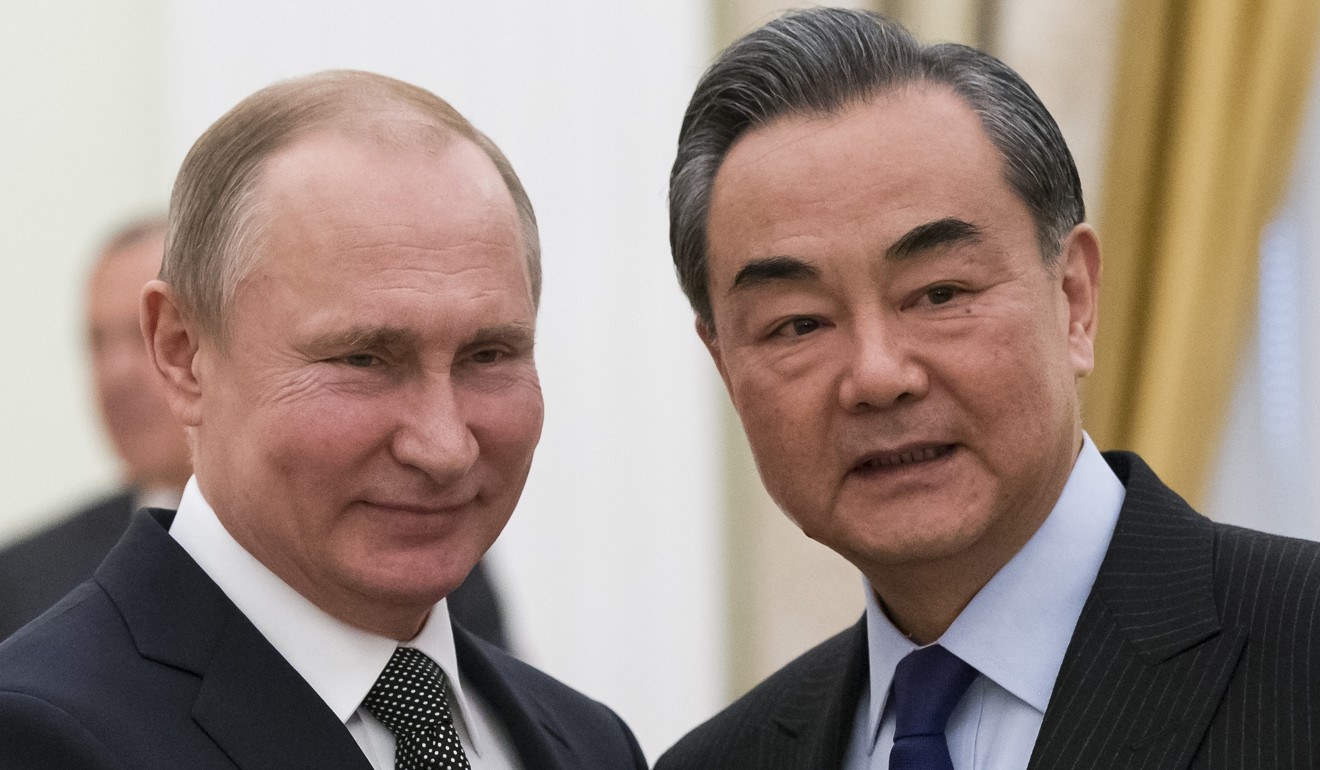
Russia and China lay stress on closer ties as they hit out at America’s ‘unilateralism’
Foreign Minister Wang Yi says Moscow and Beijing must ‘bring common sense to those who think they can do anything they like’
China and Russia have denounced what they described as America’s unilateralism as both sides sought to flag up their increasing rapport.
They have pledged to deepen their political and military ties at a time when Moscow is facing international isolation over the poisoning of a former spy and his daughter in Britain, and China is becoming embroiled in a tit-for-tat over trade with the US.
Chinese State Councillor and Foreign Minister Wang Yi visited Moscow this week for talks with his Russian counterpart and both sides used the opportunity to criticise the US while highlighting their closer military and political cooperation.
On Thursday Wang strongly criticised America’s decision to increase tariffs on Chinese exports saying: “The world community must together resist these sorts of unilateral actions and breaking of the rules. We must jointly push for global economic growth and together help bring some common sense to those who think they can do anything they like.”
State media in both countries highlighted the delivery of a missile defence system to China as a proof of closer ties between the two sides.
This week the Russian news agency Tass announced that two ships that sailed from the Baltic carrying the advanced anti-aircraft system had arrived in China.
Its report said that a third ship had been damaged during a storm in the English Channel in January, but would complete the delivery later this year.
The deal to supply China with the S-400 Triumf long-range system was signed in 2014, and military experts said it highlighted the desire of the two countries to strengthen their strategic partnership in recent years.
Beijing-based military analyst Li Jie said the delivery of the S-400 missile would help China to strengthen its air defence capability.
“The delivery of the S-400 missile is definitely a sign of the two countries’ closer cooperation, not only in diplomacy, but also of a political, economic and military consensus,” Li said.
“The arms trade is the most direct way of deepening the comprehensive strategic partnership between Beijing and Moscow. This can also result in the two countries’ trade turnover increasing.”

The two countries have recently set a goal of boosting trade to US$200 billion by 2020, with turnover between the two countries reaching US$84 billion last year, according to the Chinese Ministry of Commerce.
Song Zhongping, a former member of China’s Second Artillery Corps, said the sale of the S-400 missile system helped the balance of trade between the two nations.
“Apart from the S-400 missile systems and Su-35 fighters, Russia has no other weapons that appeal to China because it is capable of producing more advanced weapons,” Song, now a military commentator for Phoenix Television in Hong Kong, said.
“The S-400 missile system is an ideal complement to China’s existing anti-missile systems. In fact, the PLA needs the new system.”
Wang’s visit to Moscow also provided both Russia and China a platform to criticise Donald Trump’s threat to increase tariffs on Chinese products.
“If the US thinks that it can get advantages through protectionism, its calculus is wrong,” Wang warned.
Wang’s Russian counterpart Sergey Lavrov also attacked what he described as the White House’s unilateralist approach, citing Washington’s attempts to renegotiate a nuclear deal with Iran and the decision to pull out of the Paris Accord on global warming.
“It has nothing to do with diplomacy. It’s an attempt to enforce its own interests while completely ignoring the interests of others,” Lavrov said.
China’s state news agency Xinhua has also reported that Russian President Vladimir Putin had promised to visit China in June for a meeting of the Shanghai Cooperation Organisation in the eastern city of Qingdao when welcoming Wang to Russia on Thursday.
Russia’s reinvigorated support for China comes at time when Western countries have expelled hundreds of Russian diplomats in retaliation the poisoning of the Russian defector Sergei Skripal and his daughter Yulia in Britain, which the UK and allies have blamed on Russia.
Russia’s relations with America have also become increasingly fraught following allegations that Russia sought to meddle in US elections and the long-running investigation into allegations Donald Trump’s campaign colluded with Russia.
Additional reporting by Associated Press

